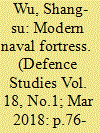| Srl | Item |
| 1 |
ID:
147403


|
|
|
|
|
| Summary/Abstract |
Sea-launched land-attack cruise missile (SLCM) strikes, one of the most common expeditionary force projection tasks, is traditionally performed by major navies using long-range offensive platforms such as major surface warships and nuclear submarines prized for their range, endurance and capacity. By contrast, small navies are deemed unsuited for such a role, since they typically comprise small warships and conventional submarines, which thereby suit them for peacetime constabulary and wartime sea denial and defensive sea control missions. However, the Russian Navy's use of such assets in late 2015 to launch SLCM strikes against Islamic State (Daesh) targets in Syria demonstrates that expeditionary force projection is not an exclusive province of major navies. Attendant challenges such as the lack of intelligence, surveillance and reconnaissance (ISR) capabilities may limit such roles by small navies but will still potentially spark greater interest amongst them in acquiring SLCMs to bolster their deterrent capabilities.
|
|
|
|
|
|
|
|
|
|
|
|
|
|
|
|
| 2 |
ID:
157990


|
|
|
|
|
| Summary/Abstract |
As fixed facilities, naval fortresses seem unlikely to be important in a sea denial strategy which is usually about mobility, but new defence technologies and the changing geostrategic environment may revive the concept of the fortress. Extended ranges of anti-ship means allow onshore firepower to engage enemies over distance, even beyond the economic exclusive zones where most maritime territorial disputes occur. In the face of size limits on missile warheads that constrain their destruction of hardened targets, various active and passive defence technologies against missiles can enhance the survivability of onshore fortresses. Furthermore, onshore locations give fortresses the advantage of being unsinkable and able to accommodate greater energy and firepower capacity in contrast to vessels, as well as other mobile platforms. The onshore nature of fortresses also gives a different political meaning to being attacked, for the clear violation of sovereignty, as opposed to vessels and aircraft in a disputed space. However, the fact those fortresses are not invincible means cooperation with other existing capabilities still necessary. The case of Vietnam demonstrates how fortresses could strengthen the inferior defence capability of a coastal state vis-à-vis. a stronger sea power.
|
|
|
|
|
|
|
|
|
|
|
|
|
|
|
|